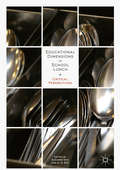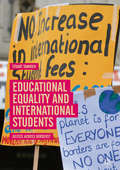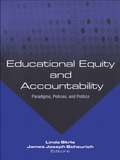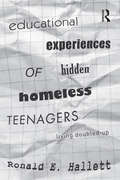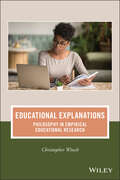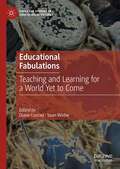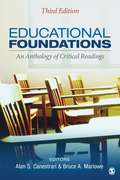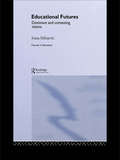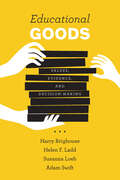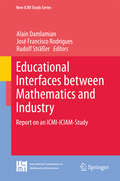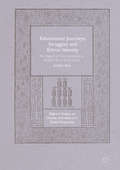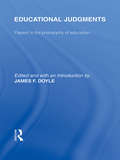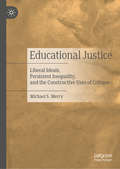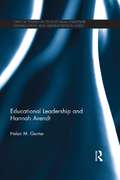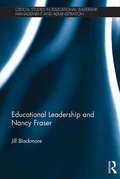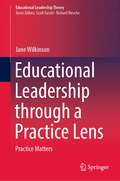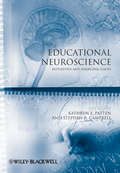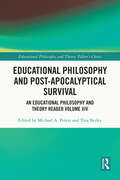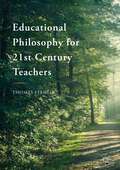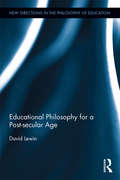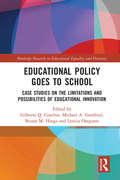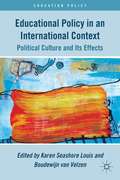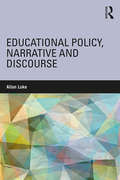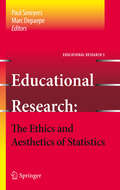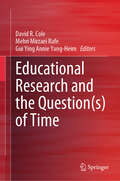- Table View
- List View
Educational Dimensions of School Lunch: Critical Perspectives
by A. G. Rud Suzanne RiceSchool lunch is often regarded as a necessary but inconvenient distraction from the real work of education. Lunch, in this view, is about providing students the nourishment they need in order to attend to academic content and the tests that assess whether content has been learned. In contrast, the central purpose of this collection is to examine school lunch as an educational phenomenon in its own right. Contributing authors—drawing from a variety of disciplinary traditions, including philosophy, sociology, and anthropology—examine school lunch policies and practices, social and cultural aspects of food and eating, and the relation among school food, the environment, and human and non-human animal well-being. The volume also addresses how school lunch might be more widely conceptualized and practiced as an educational undertaking.
Educational Equality and International Students: Justice Across Borders?
by Stuart TannockIn an increasingly globalised educational landscape, this book examines whether the principle of educational equality can be applied across nation state borders. Exploring the tension between the theory of educational equality and the reality that most educational institutions are rooted in local communities and national frameworks, the author thus probes the consequences for institutions, individuals and communities as the number of international students grows exponentially. A topic that has previously received limited attention, the author draws upon theoretical literature and an empirical study of how universities in the United Kingdom conceptualise and promote principles of educational equality for international as compared with home students. This pioneering work will be interest and value to students and scholars of international education, international students, educational equality and globalisation, as well as practitioners and policy makers.
Educational Equity and Accountability: Paradigms, Policies, and Politics (Studies in Education/Politics)
by Linda Skrla James Joseph ScheurichDespite the intense political attention that has been focused on accountability, on standardized testing, and on the equity effects of both accountability and testing, the great majority of recent debate in education policy circles has failed to attend to either the dynamism or complexity of these issues and has, instead, been carried out in a dualistic, good versus evil, fashion. In contrast, the scholarship collected in this important new volume is designed to move beyond the prevailing dualism and to push the discourse about accountability, testing, and educational equity in public schools usefully forward, and to provide a much-needed resource for researchers, policy makers, and practitioners.
Educational Experiences of Hidden Homeless Teenagers: Living Doubled-Up
by Ronald E. HallettHomeless youth face countless barriers that limit their ability to complete a high school diploma and transition to postsecondary education. Their experiences vary widely based on family, access to social services, and where they live. More than half of the 1.5 million homeless youth in America are in fact living "doubled-up," staying with family or friends because of economic hardship and often on the brink of full-on homelessness. Educational Experiences of Hidden Homeless Teenagers investigates the effects of these living situations on educational participation and higher education access. First-hand data from interviews, observations, and document analysis shed light on the experience of four doubled-up adolescents and their families. The author demonstrates how complex these residential situations are, while also identifying aspects of living doubled-up that encourage educational success. The findings of this powerful book will give students, researchers, and policymakers an invaluable look at how this understudied segment of the adolescent population navigates their education.
Educational Explanations: Philosophy in Empirical Educational Research (Journal of Philosophy of Education)
by Christopher WinchEDUCATIONAL EXPLANATIONS Educational Explanations is a comprehensive study of the main philosophical questions that confront empirical educational researchers. The book outlines the sense in which empirical educational research pursues truth and sets out and defends an account of its task as the offering of explanations for the many educational problems that claim our attention. The book goes on to look at the criteria for high quality research, the relationship between different methodological approaches and the scope and limits of intervention studies. At all stages detailed examples are presented to make the argument clearer. A distinctive feature of the book is the presentation of four detailed case studies, over four chapters, of influential educational research programmes that not only examine what they have achieved, but emphasise the conceptual issues that researchers are confronted with as they seek to provide explanations. The book goes on to examine the impact of empirical educational research on educational practice and on the practice of teachers in particular.
Educational Fabulations: Teaching and Learning for a World Yet to Come (Palgrave Studies in Educational Futures)
by Sean Wiebe Diane ConradThis highly original collection presents speculative fiction as fiction-based research to re-imagine education in the future. Given the particular convergence of economic and governmental pressures in educational institutions today, schools represent imaginative sites especially well-suited to interrogation through an SF lens. The relevance for education of the exploration and interrogation of themes related to technology, human nature, and social organization is evident; yet the speculative fiction approach is unique in its harnessing of creative capacities to envision alternatives. The contributions in this collection are generated from educational experience and research, drawing on scholarship in curriculum studies and teacher education and on the authors' experiences and imaginations as teachers, teacher educators, educational scholars, and human beings.
Educational Foundations: An Anthology of Critical Readings
by Alan S. Canestrari Bruce A. MarloweFULL DESCRIPTION Why Teach? Who Are Today's Students? What Makes a Good Teacher? Educational Foundations: An Anthology of Critical Readings answers these questions and more, providing an exciting alternative to other foundations textbooks. This anthology is aimed at students about to enter the teaching profession, those new to the profession, and anyone interested in carefully examining--and improving--schools and schooling. In this Third Edition, editors Alan S. Canestrari and Bruce A. Marlowe add new essays by classic and contemporary policy shapers and teachers. The readings are bold and refreshing, and their authors eschew unquestioning compliance. By taking a hard look at traditional educational practice, the contributors to this anthology serve as models for the kind of reflective practitioners that its editors hope that students will become while in the field.
Educational Futures: Dominant and Contesting Visions (Educational Futures Ser. #21)
by Ivana MilojevicThis book provides an overview and analysis of current tensions, debates and key issues within OECD nations, particularly Australia, the USA, Canada and the UK, with regard to where education is and should be going. Using a broad historical analysis, it investigates ideas and visions about the future that are increasingly evoked to support arguments about the imminent demise of the dominant modern educational model. Focusing neither on prediction nor prescription, this text suggests the goal is an analysis of the ways in which the notion of the future circulates in contemporary discourse. Five specific discourses are explored: globalisation; new information and communications technologies; feminist; indigenous; and spiritual. The book demonstrates the connections between particular approaches to time, visions of the future, and educational visions and practices. The author asserts that every approach to educational change is inherently based on an underlying image of the future.
Educational Goods: Values, Evidence, and Decision-Making
by Helen F. Ladd Adam Swift Harry Brighouse Susanna Loeb“An ambitious effort that succeeds in providing a fundamentally new way to talk about and . . . think about policy choices in education.” —Jeffrey R. Henig, Teachers College, Columbia UniversityWe spend a lot of time arguing about how schools might be improved. But we rarely take a step back to ask what we as a society should be looking for from education—what exactly should those who make decisions be trying to achieve?In Educational Goods, two philosophers and two social scientists address this very question. They begin by broadening the language for talking about educational policy: “educational goods” are the knowledge, skills, and attitudes that children develop for their own benefit and that of others; “childhood goods” are the valuable experiences and freedoms that make childhood a distinct phase of life. Balancing those, and understanding that not all of them can be measured through traditional methods, is a key first step. From there, they show how to think clearly about how those goods are distributed and propose a method for combining values and evidence to reach decisions. They conclude by showing the method in action, offering detailed accounts of how it might be applied in school finance, accountability, and choice. The result is a reimagining of our decision making about schools, one that will sharpen our thinking on familiar debates and push us toward better outcomes.“Every education decision-maker—and every education researcher—would benefit from reading this book.” —David N. Figlio, School of Education and Social Policy, Northwestern University“Imaginative, informative, and unfailingly constructive.” —Michael S. McPherson, co-author of Lesson Plan: An Agenda for Change in American Higher Education
Educational Interfaces between Mathematics and Industry
by Alain Damlamian José Francisco Rodrigues Rudolf SträßerThis book is the "Study Book" of ICMI-Study no. 20, which was run in cooperation with the International Congress on Industry and Applied Mathematics (ICIAM). The editors were the co-chairs of the study (Damlamian, Straesser) and the organiser of the Study Conference (Rodrigues). The text contains a comprehensive report on the findings of the Study Conference, original plenary presentations of the Study Conference, reports on the Working Groups and selected papers from all over world. This content was selected by the editors as especially pertinent to the study each individual chapter represents a significant contribution to current research.
Educational Journeys, Struggles and Ethnic Identity
by Xinyi WuThis book examines how state schooling in China has economically, culturally, and ideologically had an impact on and gradually transformed a traditional Muslim Hui village in rural Northwestern China. By discussing the interpretation and appropriation of dominant educational discourse of "quality" in the rural context, it illustrates the dichotomies of poverty and prosperity, civility and uncivility, and religiosity and secularity as they are perceived and understood by teachers, parents and students. Based on an original ethnographic research conducted in a secondary school, it further touches upon Muslim Hui students' negotiations of filial, rural, and ethnoreligious identities when they struggle to seek a life of their own in the journey to prosperity. The book introduces audiences to multiple ways in which Muslim Hui students construct and negotiate identities through state schooling, especially the educational heterogeneity experienced by various Muslim youth. It also captures the changing rural-urban dynamic as state schooling continues to guide local formal educational activities as well as create tensions and confusions for both teachers and parents. Most importantly, the book challenges stereotypes about Muslim Hui students in Northwest China being assimilated into the mainstream culture by demonstrating how local Muslims live, study, pray, and fulfil the five pillars of Islam. It will be highly relevant to students and researchers in the fields of education, anthropology, sociology, and religious studies.
Educational Judgments (International Library of the Philosophy of Education Volume 9): Papers in the Philosophy of Education
by James F. DoyleThe topics covered in this volume, originally published in 1973, include the need for a more adequate concept or definition of education, the issue of whether indoctrination is compatible with education, particularly with moral education, and the processes of judging the merits of different approaches to aesthetic education. Two contributors present complementary analyses of the relations between freedom as a characteristic of institutions and the process of learning to be a free man. There is discussion of the neglected subject of rights and duties in education, with special emphasis on the question of a universal right to education. The volume concludes with papers on the relevance of philosophy to the practical judgments of educators and to education as a field of study.
Educational Justice: Liberal Ideals, Persistent Inequality, and the Constructive Uses of Critique
by Michael S. MerryThis book examines the philosophical, motivational, and practical challenges of education theory, policy, and practice in the twenty-first century. There is a loud and persistent drum beat of support for schools, for citizenship, for diversity and inclusion, and increasingly for labor market readiness with very little critical attention to the assumptions underlying these agendas, let alone to their many internal contradictions. Merry does not neglect the historical, comparative international context so essential to better understanding where we are, as well as what is attainable in terms of educational justice. He argues that we must constructively critique some of our most cherished beliefs about education if we are to save the hope of real justice from the rhetoric of imagined justice.
Educational Leadership and Hannah Arendt (Critical Studies In Educational Leadership, Management And Administration Ser.)
by Helen M. GunterThe relationship between education and democratic development has been a growing theme in debates focussed upon public education, but there has been little work that has directly related educational leadership to wider issues of freedom, politics and practice. Engaging with ELMA through the work of Hannah Arendt enables these issues of power to be
Educational Leadership and Nancy Fraser: Nancy Fraser And Iris Marion Young (Critical Studies in Educational Leadership, Management and Administration)
by Jill BlackmoreDrawing on the work of Nancy Fraser, this book offers a critical view of contemporary educational leadership and reform discourses, exploring how her key concepts of redistribution, recognition and representation may apply to social and therefore educational justice. Fraser offers a political and pragmatic reconciliation between feminist, neo-Marxist, critical and post-structuralist theories. This book outlines how Fraser has worked on and worked over theories of social justice and how this can inform how we can understand educational theory, policy and practice generally. In particular, the book focuses on the field of educational administration and leadership (ELMA) as it relates to equity issues such as school choice and inequality, gender and inclusive leadership, and alternative schooling. Fraser’s argument about ‘scaling up’ social justice theory is shown to be highly salient given the emergence of the field of transnational education policy and its role in the context of intensified nation-state and edu-business competition. Overall, through the lens of Nancy Fraser’s unitary framework, this book considers epistemological questions about the nature of knowledge, examines the relationship between the state, the individual, education and social movements, addresses the difficulties and dilemmas which arise due to the intersections of gender, class, race, sexuality and culture in a globalized context, and illustrates how the principles of social justice can be mobilized by leaders in everyday practice. Educational Leadership and Nancy Fraser is an illuminating read for those policymakers, researchers and practitioners engaged in the field of educational administration, leadership and social justice.
Educational Leadership through a Practice Lens: Practice Matters (Educational Leadership Theory)
by Jane WilkinsonThis book provides the theoretical and analytical resources for an urgent rethinking of the social project of educating and educational leading. It examines what educational leadership is, namely the politics and power of leadership as a practice, and what it can and should be, offering a pedagogical and praxis-informed approach to educational practice. Drawing on research conducted at various Australian schools and education districts, it argues for a reframing of educational leadership as pedagogical practice/praxis to transform theorising and practice in the field. The book provides a rich account of educational leading through a practice lens, bringing into dialogue the theory of practice architectures with site ontologies, Bourdieu’s thinking tools and feminist critical scholarship.The book tracks the practices and praxis of educational leaders as they grapple with the changing landscape and forces of educational policies that have informed Australian education. It reimagines education leadership by integrating Continental and Northern European understandings of pedagogy and praxis as being morally and ethically informed, as opposed to the narrower Anglophone notions of pedagogy as teaching and learning. The book adds to the body of knowledge on the “actual work of leadership” as a “distinct set of practices” that is morally and ethically informed. Readers will find a more holistic understanding of educational leadership practice and praxis, based on the everyday accounts of educational leaders, teachers and students in schools and education districts.
Educational Neuroscience: Initiatives and Emerging Issues (Educational Philosophy and Theory Special Issues #25)
by Kathryn E. Patten Stephen R. CampbellEducational Neuroscience provides an overview of the wide range of recent initiatives in educational neuroscience, examining a variety of methodological concerns, issues, and directions. Encourages interdisciplinary perspectives in educational neuroscience Contributions from leading researchers examine key issues relating to educational neuroscience and mind, brain, and education more generally Promotes a theoretical and empirical base for the subject area Explores a range of methods available to researchers Identifies agencies, organizations, and associations facilitating development in the field Reveals a variety of on-going efforts to establish theories, models, methods, ethics, and a common language
Educational Philosophy and Post-Apocalyptical Survival: An Educational Philosophy and Theory Reader Volume XIV (Educational Philosophy and Theory: Editor’s Choice)
by Michael A. Peters Tina BesleyThis collection concerns educational philosophy and post-apocalyptical survival. This 14th volume in the Editor's Choice series provides insights into the philosophy of education as it relates to the concepts of civilizational collapse, discourses of decline, educating for survival amid climate emergency, cultural apocalypse and the pandemic. It is based on a series of editorials and articles published in the Educational Philosophy and Theory journal through its 55-year history. The articles, written by Editor Michael Peters and colleagues, explore the concept of global apocalypse from the educational philosophy lens. It will be of interest to scholars in philosophy of education and anyone who is working in the field of post-apocalyptic studies.
Educational Philosophy for 21st Century Teachers
by Thomas StehlikThis book explores education in the 21st century in post-modern Western societies through a philosophical lens. Taking a broad perspective of education and its attendant terminology, assumptions, myths and influences; the author examines why we teach as opposed to how. In doing so, he includes not only teachers, but all adults who are involved in bringing up children. Applying philosophical theories throughout history to present day practice, this volume is sure to be a useful resource not only for teachers who are just starting out, but those with an interest in education in the past, present and future. This wide-ranging book will be valuable for educators, parents and educational policy makers, and all those who believe it takes a village to raise a child.
Educational Philosophy for a Post-secular Age (New Directions in the Philosophy of Education)
by David LewinEducational Philosophy for a Post-secular Age reinterprets post-secular insights for educational theory by recognising that the persistence of religion in contemporary life raises new questions about the place of religion in education. Two common assumptions are critically examined: first, that the better educated a society becomes, the more secular it becomes, and second, that religion can and should be separated from public education. For too long, religion has had an uneasy relationship with education, being seen either as a foreign invader, a problem to be solved, or as a mechanism by which to reinforce particular religious, cultural or national identities. In order to move educational theory beyond the debates about indoctrination and competing rights between parents, children and nation states, the argument undercuts rationalist conceptions of religion and education that tend to frame the debates in terms of competing truth claims or worldviews. Drawing on a diverse range of theological, philosophical and educational sources, this book demonstrates the continuing significance of the Christian mystical tradition to educational theory. It proposes an exploration of democratic education that brings together two apparently irreconcilable poles: the meaning of religion in education and contemporary life, and the need for a deliberative democratic process that is fit for the post-secular age. It argues that religious literacy can be served by democratic encounters in public religious education. Educational Philosophy for a Post-secular Age will be of interest to researchers, academics and postgraduate students in the fields of the philosophy of education, philosophy of religion, education policy, politics, anthropology and cultural theory. It will particularly appeal to those, of both secular and religious persuasions, interested in the place of religion in education and public life.
Educational Policy Goes to School: Case Studies on the Limitations and Possibilities of Educational Innovation (Routledge Research in Educational Equality and Diversity)
by Gilberto Q. Conchas Michael Gottfried Briana M. Hinga Leticia OsegueraEducational policies explicitly implemented in order to reduce educational gaps and promote access and success for disenfranchised youth can backfire—and often have the unintended result of widening those gaps. In this interdisciplinary collection of case studies, contributors examine cases of policy backfire, when policies don’t work, have unintended consequences, and when policies help. Although policy reform is thought of as an effective way to improve schooling structures and to diminish the achievement gap, many such attempts to reform the system do not adequately address the legacy of unequal policies and the historic and pervasive inequalities that persist in schools. Exploring the roots of school inequality and examining often-ignored negative policy outcomes, contributors illuminate the causes and consequences of poor policymaking decisions and demonstrate how policies can backfire, fail, or have unintended success.
Educational Policy in an International Context
by Karen Seashore Louis Boudewijn Van VelzenProvides a provocative examination of the interplay between political culture and educational policy. The goal is to provide a better understanding of how different countries are responding to the global exchange of policy ideas that includes 'the standards movement' and 'new public management' or accountability in the public sector.
Educational Policy, Narrative and Discourse
by Allan LukeThis collection of Allan Luke’s key writings on educational policy, curriculum, and school reform follows the development and use of critical discourse analyses to study educational policy and practice. Turning to a series of narrative analyses of the relationship between politics, culture, economics, and education, Luke‘s writings address the challenges of shifting from an academic and scientific critique of policy to ‘getting your hands dirty’ in the making of state educational policy. The volume includes international examples of policy formation for social justice and equity, and closes with an auto-ethnographic view on policymaking and the need for increased critical, sociological evidence-based educational reform. Together with its companion volume, Critical Literacy, Schooling and Social Justice: The Selected Works of Allan Luke, this collection gathers Luke’s seminal key writings spanning the fields of education, applied linguistics, sociology, and cultural studies for the benefit of scholars, students, teachers, and teacher educators around the world.
Educational Research - the Ethics and Aesthetics of Statistics
by Paul Smeyers Marc DepaepeStatistics are everywhere. Their power and their undoubted efficacy in many areas have given rise to faith in measurement and metrics. More of them will tell us all that we need to know. Their use carries with it a number of presuppositions: that reality can be satisfactorily represented and that it can be controlled or the risks managed. The papers in this book interpret the ethics and aesthetics of statistics in terms of representation, visualisation and accessibility, focus on the appeal of 'simplicity', of technical languages, numbers, diagrams and pictures, and pay attention to their connection with action plans. The book explores what has made educational researchers dependent on statistics, and deals with their use in areas such as the prevalence of maltreatment of children, European citizenship, well-being and happiness, illegal migrants, and university expansion. There is discussion of how the quest for more and better statistics finds its voice in policy initiatives that become slogans, and how public opinion polls are used to rationalise political decision-making. Can a more limited and modest use be made of statistics which does not deflect attention away from education's core business and which does not destroy the local practical knowledge that on which good education is based? 'Smeyers and Depaepe continue to bring together a significant international group of educational philosophers and historians on topics of importance to researchers. This fifth volume in their series takes up the 'gold standard' use of statistics in case studies not contributed elsewhere. I highly recommend this text to counter a current over-emphasis on technique in research methodology. Use of statistics remains but herein under new, insightful conceptualizations.' Lynda Stone, Philosophy of Education, University of North Carolina at Chapel Hill, USA 'Once again, Depaepe and Smeyers succeeded in bringing together distinguished international and cross-disciplinary scholars exploring very timely and critical issues in current educational research. This is a groundbreaking book on a theme that can't be ignored by educational researchers and those interested in a better understanding of the culture of science and science as culture. Moreover, the present book instigates to study history of educational research, a limited but developing field, and invites reflection to those who are sometimes too reliant on number crunching as a mode of interpretation and rather credulous in the acceptance of institutional records. Frank Simon, Faculty of Psychology and Educational Sciences, Ghent University, Belgium
Educational Research and the Question(s) of Time
by David R. Cole Mehri Mirzaei Rafe Gui Ying Annie Yang-HeimThis book fully explores the question(s) of time in educational research and achieves the acceleration and merging of inquiry with action to understand change and implement these findings through practice. It deals with the philosophy of education, higher education, schooling (the curriculum), time displacement, technology, the environment and policy. This book focuses on time revolution(s). It explores new ways of thinking about time, that question a linear/arrow in time, and sets into motion an educational research agenda to extract revolutions of time. Furthermore, this book figures the dimension of time in teaching and learning by extending and deepening the engagement with time in education. For example, it analyzes the climate crisis in terms of education and how the realization that the climate is changing sits parallel and adjacent to pedagogy. The climate crisis and how to do anything about it through education is an example of how considering the dimension of time opens up education beyond quick or narrow fixes and introduces a profound synthesis for the future.
